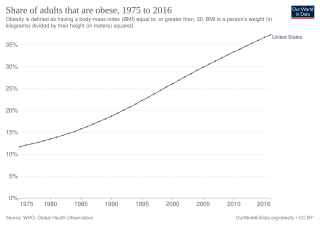Related Research Articles

Parenting or child rearing promotes and supports the physical, cognitive, social, emotional, and educational development from infancy to adulthood. Parenting refers to the intricacies of raising a child and not exclusively for a biological relationship.

Adolescence is a transitional stage of physical and psychological development that generally occurs during the period from puberty to adulthood. Adolescence is usually associated with the teenage years, but its physical, psychological or cultural expressions may begin earlier or end later. Puberty typically begins during preadolescence, particularly in females. Physical growth and cognitive development can extend past the teens. Age provides only a rough marker of adolescence, and scholars have not agreed upon a precise definition. Some definitions start as early as 10 and end as late as 30. The World Health Organization definition officially designates an adolescent as someone between the ages of 10 and 19.

Alcohol abuse encompasses a spectrum of alcohol-related substance abuse, ranging from the consumption of more than 2 drinks per day on average for men, or more than 1 drink per day on average for women, to binge drinking or alcohol use disorder.

Youth is the time of life when one is young. The word, youth, can also mean the time between childhood and adulthood (maturity), but it can also refer to one's peak, in terms of health or the period of life known as being a young adult. Youth is also defined as "the appearance, freshness, vigor, spirit, etc., characteristic of one, who is young". Its definitions of a specific age range varies, as youth is not defined chronologically as a stage that can be tied to specific age ranges; nor can its end point be linked to specific activities, such as taking unpaid work, or having sexual relations.
The Dunedin Multidisciplinary Health and Development Study is a detailed study of human health, development and behaviour. Based at the University of Otago in New Zealand, the Dunedin Study has followed the lives of 1037 babies born between 1 April 1972 and 31 March 1973 at Dunedin's former Queen Mary Maternity Centre since their birth. Teams of national and international collaborators work on the Dunedin Study, including a team at Duke University in the United States. The research is constantly evolving to encompass research made possible by new technology and seeks to answer questions about how people's early years have an impact on mental and physical health as they age.

Childhood obesity is a condition where excess body fat negatively affects a child's health or well-being. As methods to determine body fat directly are difficult, the diagnosis of obesity is often based on BMI. Due to the rising prevalence of obesity in children and its many adverse health effects it is being recognized as a serious public health concern. The term overweight rather than obese is often used when discussing childhood obesity, as it is less stigmatizing, although the term overweight can also refer to a different BMI category. The prevalence of childhood obesity is known to differ by sex and gender.
Gender dysphoria in children (GD), also known as gender incongruence of childhood, is a formal diagnosis for children who experience significant discontent due to a mismatch between their assigned sex and gender identity. The diagnostic label gender identity disorder in children (GIDC) was used by the Diagnostic and Statistical Manual of Mental Disorders (DSM) until it was renamed gender dysphoria in children in 2013 with the release of the DSM-5. The diagnosis was renamed to remove the stigma associated with the term disorder.
Emerging adulthood, early adulthood, or post-adolescence refers to a phase of the life span between late adolescence and early adulthood, as initially proposed by Jeffrey Arnett in a 2000 article from the American Psychologist. It primarily describes people living in developed countries, but it is also experienced by young adults in wealthy urban families in the Global South. The term describes young adults who do not have children, do not live in their own homes, and/or do not have sufficient income to become fully independent. Arnett suggests emerging adulthood is the distinct period between 20 and 29 years of age where young adults become more independent and explore various life possibilities.

Alcoholism in family systems refers to the conditions in families that enable alcoholism and the effects of alcoholic behavior by one or more family members on the rest of the family. Mental health professionals are increasingly considering alcoholism and addiction as diseases that flourish in and are enabled by family systems.

Obesity is common in the United States and is a major health issue associated with numerous diseases, specifically an increased risk of certain types of cancer, coronary artery disease, type 2 diabetes, stroke, and cardiovascular disease, as well as significant increases in early mortality and economic costs.

Binge drinking, or heavy episodic drinking, is drinking alcoholic beverages with an intention of becoming intoxicated by heavy consumption of alcohol over a short period of time, but definitions vary considerably.

Major depressive disorder, often simply referred to as depression, is a mental disorder characterized by prolonged unhappiness or irritability. It is accompanied by a constellation of somatic and cognitive signs and symptoms such as fatigue, apathy, sleep problems, loss of appetite, loss of engagement, low self-regard/worthlessness, difficulty concentrating or indecisiveness, or recurrent thoughts of death or suicide.
The Pacific Islands Families Study is a long-running, cohort study of 1398 children of Pacific Islands origin born in Auckland, New Zealand during the year 2000. The cohort of participants was selected from babies born between 15 March 2000 and 17 December 2000 at Middlemore Hospital with at least one parent identifying as having Pacific Islands origin.

A major earthquake occurred in Christchurch on Tuesday 22 February 2011 at 12:51 p.m. local time. The Mw6.2 earthquake struck the Canterbury region in the South Island, centred 6.7 kilometres (4.2 mi) south-east of the central business district. It caused widespread damage across Christchurch, killing 185 people in New Zealand's fifth-deadliest disaster.
David Murray Fergusson was a New Zealand psychologist. He was a professor of psychological medicine at the University of Otago, Christchurch, from 1999 until 2015. He is notable for work on the Christchurch Health and Development Study and for his research on abortion and mental health.
Julia Rucklidge is a Canadian-born clinical psychologist who is the director of the Mental Health and Nutrition Research Group at the University of Canterbury in New Zealand. Her research has centered on mental health and nutrition.
Rachael Waring Taylor is a New Zealand childhood nutrition academic. She is currently a full professor at the University of Otago.

Breastfeeding and mental health is the relationship between postpartum breastfeeding and the mother's and child's mental health. Research indicates breastfeeding may have positive effects on the mother's and child's mental health, though there have been conflicting studies that question the correlation and causation of breastfeeding and maternal mental health. Possible benefits include improved mood and stress levels in the mother, lower risk of postpartum depression, enhanced social emotional development in the child, stronger mother-child bonding and more. Given the benefits of breastfeeding, the World Health Organization (WHO), the European Commission for Public Health (ECPH) and the American Academy of Pediatrics (AAP) suggest exclusive breastfeeding for the first six months of life. Despite these suggestions, estimates indicate 70% of mothers breastfeed their child after birth and 13.5% of infants in the United States are exclusively breastfed. Breastfeeding promotion and support for mothers who are experiencing difficulties or early cessation in breastfeeding is considered a health priority.

Tasileta "Leta" Teevale was a Samoan New Zealand academic, and was the inaugural director of the Pacific Development Office at the University of Otago. In 2021, she was appointed a Member of the New Zealand Order of Merit, for services to Pacific education and public health research.
References
- 1 2 University of Otago, Christchurch. "Christchurch Health and Development Study". www.otago.ac.nz. Retrieved 2021-07-14.
- 1 2 3 Boden, Joseph (2020-06-10). "What 40 years following thousands of NZ people tells us about cannabis harm". The Spinoff. Retrieved 2021-07-14.
- 1 2 3 "THE DEVELOPMENT OF WELLBEING IN CHILDREN" (PDF).
- ↑ Fergusson, D.; Horwood, J. (2001). "The Christchurch Health and Development Study: Review of Findings on Child and Adolescent Mental Health". The Australian and New Zealand Journal of Psychiatry. 35 (3): 287–296. doi:10.1046/j.1440-1614.2001.00902.x. PMID 11437801. S2CID 35768651.
- ↑ "Single-sex schools better, research shows". Stuff. 2009-08-31. Retrieved 2021-07-19.
- ↑ "Teen regular drinkers more likely to battle alcohol as adults". medicalxpress.com. Retrieved 2021-07-14.
- ↑ "Smacking children doesn't work, researcher says, but new study suggests many Kiwi parents still for it". TVNZ. Retrieved 2021-07-14.
- ↑ "Kiwi kids have a 50/50 chance of ending up a fat adult - study". Stuff. 2018-03-23. Retrieved 2021-07-14.
- ↑ "Study finds 28 percent of middle-aged kiwis have tried meth - and reveals the drug's links with violence". RNZ. 2020-02-19. Retrieved 2021-07-14.
- ↑ "'Positive parenting' can buffer against alcoholism in adulthood". New Zealand Doctor. Retrieved 2021-07-14.
- ↑ "New research to study ongoing 'quake brain' impact on Cantabrians". Stuff. 2021-02-17. Retrieved 2021-07-14.